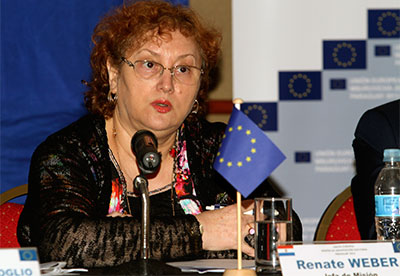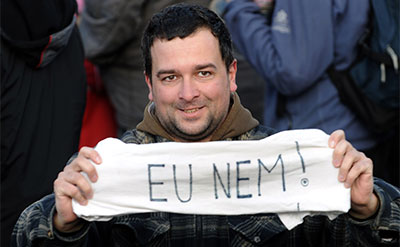
Hungary’s independent media struggle against economic pressure, intimidation
“This is a new wave of clampdowns by the government–they want to have another four-year term with even less critical media than before,” said Szabolcs, a 21-year-old economics student, one of thousands of people who marched in the streets of Budapest in June, chanting “Free Country, Free Press!” The demonstrations were in reaction to several…
EU underscores support of free expression, but slights access to information
A new document on freedom of expression and opinion, adopted May 12 by the 28 foreign ministers of the European Union, presses nearly all the right buttons. Drawing its inspiration from international human rights norms as well as from the EU’s treaties and its charter of fundamental rights, the document reaffirms the role of freedom…
CPJ urges free expression be part of post-2015 MDG agenda
Dear Ambassadors Kamau and Kőrösi: I am writing to you in your capacity as the co-chairmen of the Open Working Group on Sustainable Development Goals. Your work and the recommendations of your group will help frame the discussion in the coming year as United Nations member states seek to agree a set of objectives to succeed the Millennium Development Goals beyond 2015. We at the Committee to Protect Journalists (CPJ) believe it is vital that your report to the UN Secretary General Ban Ki Moon later this year include freedom of expression and access to information and independent media as part of the post-2015 agenda.
Hello, I’m Robert Capa, may I take a picture?
How would Robert Capa and Joe Pulitzer have reacted to the law that came into force on March 15 in their country of birth, Hungary? Let us guess that they would have been stunned. A provision in the new Hungarian civil code forbids taking pictures without the permission of everyone in the photograph.
Attacks on the Press in 2013: Hungary
Hungary’s record of press freedom and human rights deteriorated in 2013, resulting in calls from some European lawmakers to suspend the country’s voting rights in the European Union. Authorities adopted controversial changes to the constitution in March, including a provision limiting pre-election political advertising solely to broadcasters–most of which are controlled by or affiliated with…

European Parliament reaffirms principles, but action lacks
The European Parliament, meeting in a plenary session in Strasbourg, France, adopted today a resolution stating that “changes in EU member state’s media laws that make it easier for governments to interfere in the media should be monitored every year at EU level.”
Attacks on the Press in 2012: Hungary
Despite pressure from the European Commission, the Hungarian government implemented a media law that requires “balanced reporting” and imposes fines for transgressions. The government adopted only minor amendments in response to demands from the commission. Prime Minister Viktor Orban’s right-wing party, Fidesz, was able to withstand the pressure thanks to the support of the European…
Red flags in the European Union press freedom debate
The European Union enjoys waving the banner of press freedom overseas. However, it is sometimes at a loss when it has to define its approach to press freedom among its own member states. Last year, the EU tried and failed to convince the Hungarian government to radically amend its highly controversial media law. The conservative…
Greek far-right party casts shadow on Europe press freedom
The celebration Tuesday of the 50th anniversary of the Association of European Journalists (AEJ) should have been a joyful and lighthearted affair. Dozens of journalists from all parts of the European Union had traveled to Brussels to share memories, new projects, champagne, and petits fours.
